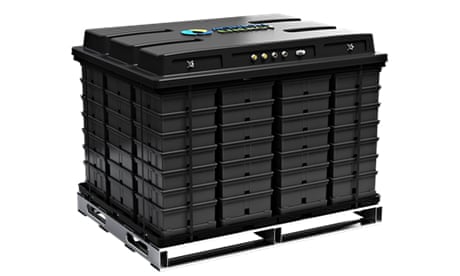From cell phones to laptops to electric cars, the world is becoming increasingly dependent on batteries. Unfortunately, this convenience comes at a cost: some common battery materials are toxic and require special treatment after their end of life. A new company is hoping to combat this cycle: It has begun using more benign materials to make its energy cells.
Aquion Energy, a Pittsburgh-based startup that uses water and salt for some of the key components in its batteries, recently won a Katerva Award in the energy and power category. (Katerva, which spotlights innovation in sustainability, also honored several other organizations, including Archive Global, in the urban design category, and MBA Polymers, which won the overall award).
There's a big market for more sustainable batteries. Aquion, along with several other battery companies, has received billions of federal research dollars since 2009.
It isn't hard to see why the US government would be interested in battery development. The success of Aquion, and other advanced battery developers, could have long-reaching sustainability implications. Among other things, new, safer and more efficient batteries could be key for electric cars, and for enabling more solar and wind power.
In the case of solar and wind power, batteries could help add reliability to an inconsistent energy source. While production of electricity from the wind and sun can vary, based on weather conditions and time of day, the electric grid that they flow into must maintain a constant balance of supply and demand in order to avoid blackouts and other problems. That makes energy storage a key consideration for any effort to promote renewable energy development.
Some energy storage project developers are targeting corporate customers. Among other things, batteries make it possible for businesses with rooftop solar panels to bank some of that electricity for use at another time, such as for backup power during a storm.
Companies could also use battery systems to lower their monthly electric bills. Many utilities charge a higher rate during times of peak demand, in order to ensure that they have ample power on hand to serve any spike in demand. To avoid these fees, companies could charge their batteries when electricity is cheap, such as at night, and discharge them when the rates are high.
But the payback period for such a system remains too long for many businesses, said Sam Jaffe, an analyst at Navigant Research. Prices will have to come down – and that's where battery research comes in.
Some companies, such as SolarCity, Stem and Green Charge Networks, have raised funds to finance corporate battery projects. Their customers would forgo the expenses of buying the equipment. Instead, they would sign a long-term contract to pay a monthly fee for using the batteries.
Aquion's contribution
Aquion, which began as a spinoff of Carnegie Mellon University, is venture-capital funded. It has already moved its research out of the lab and into manufacturing: the company makes money by selling its batteries to distributors or project developers for stationary energy storage.
One factor that distinguishes Aquion is the novel cocktail of materials that it uses in its batteries. Each cell has an electrode at each end, a separator to divide the two, and an electrolyte to create an electrochemical reaction with the electrodes to produce electricity. Aquion uses manganese oxide and activated carbon for the electrodes, and a sodium sulfate solution for the electrolyte. The separator is made from a synthetic material that has a structure similar to cotton.
"We are using common and benign materials of salt water, dirt and carbon," said Ted Wiley, vice president of product and corporate strategy at Aquion. "We are using materials that are non-toxic and readily available in high volumes. And they won't be damaging to the environment."
Jaffe agrees, noting that Aquion's materials are indeed more environmental friendly than some of the batteries on the market today, including the far more common lead-acid and nickel-cadmium cells.
Lead-acid batteries are commonly used to power cars or for use as back-up power systems. Lead, which is toxic, requires special handling after the batteries are spent. In fact, 96% of lead acid automotive batteries are recycled, according to the U.S. Environmental Protection Agency. New batteries usually contain 60% to 80% recycled lead and plastic.
Aquion's products also compete with lithium-ion batteries. These cells, which commonly power laptops and cell phones, are also used in electric cars because they can hold a lot of more energy in a given volume than lead-acid batteries. Many energy storage project developers also market lithium-ion batteries to businesses and utilities.
The materials inside lithium-ion batteries pose fewer environmental risks than those of lead-acid or nickel-cadmium cells when they end up at landfills, Jaffe said. But lithium-ion batteries can pose ethical issues. Cobalt, a material that is commonly used for consumer electronics batteries, is often sourced from the Democratic Republic of Congo, where profits from selling minerals has helped fund its long-standing and bloody internal wars.
Lithium-ion batteries also could pose a greater fire risk because their electrolytes are flammable. Part of the ongoing research to improve lithium-ion batteries involves coming up with less flammable electrolytes.
Aquion's batteries, which Wiley says are safer and longer-lasting than lithium-ion ones, have already begun to find a market. The company is gearing up for mass production at its new factory, which will be able to produce 200MW hours of batteries per year. And, Wiley noted, it will reach that level by the second half of this year. Siemens has bought a system for its manufacturing and testing facility in Georgia, and several utilities are doing field testing of Aquion's systems.
Aquion has already shipped to its first business customer: a ranch in California that is using a 60 kilowatt-hour system to run its daily operations, Wiley said.

Comments (…)
Sign in or create your Guardian account to join the discussion